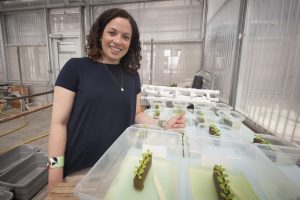“Outreach and engagement is at the core of what universities should do—that is how we identify societal problems and develop and communicate solutions,” says Rosa Raudales, an associate professor of plant science and landscape architecture and an extension specialist in the College of Agriculture, Health and Natural Resources.
Raudales recently added another title to her name – she’s the director of UConn’s new Office of Outreach and Engagement, tasked with coordinating the University’s public engagement activities and establishing policies to promote best practices in outreach across schools, colleges, centers, institutes, and regional campuses.
One month on the job, Raudales is already using her own personal and professional commitment to working within communities to assess how UConn can more broadly and efficiently serve its diverse constituencies within the state of Connecticut.
“When you look at how community engagement works, it’s really at the core of how universities were founded,” Raudales says. “I’m a scientist who works with plants, but I mostly do research because it’s a means to find solutions for growers. For me, the reason to do science is to advance society. This new role is an opportunity to do that at a bigger scale.”

Beyond an early agenda that includes both internal and external assessments of community engagement needs and strategies, the office hopes to serve as a “front door” to the university – a point of contact to which community members can turn when they’re looking to access the University’s broad array of expertise and assistance.
That front-door function is needed, says Julia Yakovich, UConn’s director of service learning, who will be working with Raudales as the associate director of the new Office of Outreach and Engagement, because community members often don’t know where to turn.
But when those connections are made, Yakovich says, the relationships pay dividends for all involved.
“When we combine community with the University and reach out in ways that meaningfully engage them – where they are excited, where they want be involved, where they feel that they have a stake in the process – that’s where authentic relationships are created,” she says. “That’s where gaps in the system begin to bridge for the betterment of all. It’s the most important role that we have as a university. The outcomes that I’ve seen in my time for students, partners, and faculty have been beyond anything I could have ever imagined.”
Raudales also anticipates working closely with UConn’s new Office for Business Engagement that has launched as one-stop shop for businesses and corporations looking to collaborate with the University.
“We are partner offices in the sense that we are community centered and they’re business driven, but they’re also a gateway to the University,” Raudales says. “If you’re a business trying to develop something, but you need someone to help, you reach out to that office and they’ll make that connection, because businesses are another type of group that need services from the University.”
In addition to offering students engagement opportunities with local businesses, the Office of Business Engagement hopes to help assist partnerships with industry that will contribute to a diverse talent pipeline, develop research opportunities, support workforce development, further utilize the University’s technology development and licensing capabilities, and support and build strategic partnerships.
“The UConn Office of Business Engagement’s mission is to create shared value by building lasting, mutually beneficial relationships between businesses and the University of Connecticut. The office is here to help businesses easily navigate the complexities of a large university and showcase the many capabilities that we offer to address their needs,” says Sara Mahoney, assistant vice president for corporate and foundation relations at the UConn Foundation, who is leading the Office of Business Engagement initiative. “Whether it is talent development, working on solutions to solve a business problem, supporting their philanthropic initiatives, or perhaps a multifaceted relationship that encompasses many engagement activities altogether, we want it to be streamlined and efficient.”
Potential partners for the Office of Business Engagement range from startups, family-owned and small businesses, to large Fortune 500 companies, Mahoney says.
“We can help connect them to the right University contacts, build comprehensive cross campus engagement strategies and tailor the right partnership for their business needs,” she explains. “I think of our team as the concierge for the business community. We want to create win-win partnerships that achieve company objectives, and achieve and support the strategic initiatives of the University – doubling research, driving workforce development, and incorporating life-transformative initiatives for our students. Partnering with the new Office of Outreach and Engagement is another example of how companies might want to work with us to build up their community efforts. We are thrilled to work together with Rosa’s new office.”
In a recent interview, UConn Today asked Raudales about her goals for the Office of Outreach and Engagement in both the short and long term as well as what the University and members of the community at large can expect when they reach out for help:
You’re building a brand new office with a very ambitious agenda. What do you hope to accomplish in the first year?
The mission of our office is to be a service office for both UConn and external communities.
In this first year, we have defined three goals for ourselves. First, we are going to create an inventory of programs that are doing any sort of community engagement in the University – we want UConn people to know who is working with whom so that we can operate as a single UConn and better represent ourselves.
We also want to promote community engagement in the University, and we think that by putting that platform out there, people might either be encouraged or get ideas on things that they could be doing.
Second, we plan to submit an application this first year for the Carnegie Foundation Community Engagement Elective Classification. UConn used to be part of that group, but it has lapsed.
Third, we are going to be developing guidelines on how to do community engagement, with a focused scholarship perspective. We want to make sure that, when people are doing community engagement, it is approached from a scholarship perspective – that people get publications, track what they need to be tracking, get grants to support their activities, and so forth. We think writing those guidelines will help, for example, younger faculty who are in tenure track, but also units that don’t do as much community engagement and don’t know how to measure it.
The Service Learning projects that Julia is leading are still going on, but we are not going to start any new initiatives with the community just yet, because I don’t think we have the manpower for that.
After that inward-looking first year, what can people expect to see from your office?
In our second year, we’re hoping to start an assessment of what the community needs. We’re still defining and identifying those communities, but that’s where we want to start so that we can then support those needs from their perspective, and not as much from what we as researchers want to do in the community.
A lot of programs have started that way – we get a grant and a program is developed, so we go from UConn to the community. We want to start promoting a culture where we listen to the community first, and then we develop programs based on their specific needs and desires.
So, our second year will be more of an outward focus where we’ll try to bring in more collaborators from the outside and see how we can better serve members of the community.
If individual students or faculty, groups, departments, organizations, or clubs are interested in starting or joining a community engagement initiative, what should they do?
We are here to make the connections with whomever needs help to make a connection. When our new website launches, it will have a form where people can reach out to us. If someone has specific requests, we want serve those groups.
If you’re reading this article and you’re a member of the community, you should know that you can reach out to us at any time, and we will do our best to find the help you need.
If you’re someone from our UConn community reading the article, we want you to know that if you’re interested in doing any type of community engagement type activities, you can reach out to us and we will also help you reach a community, find a partner, or help you succeed in whatever you’re trying to do.
We are a service office within the University – that’s what we offer, and that’s what we aim to do.
The Offices of Outreach and Engagement and of Business Engagement are in the process of developing their websites. In the meantime, you can connect with these offices by emailing Raudales at rosa.raudales@uconn.edu and Mahoney at SMahoney@foundation.uconn.edu.



